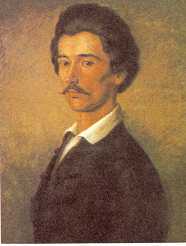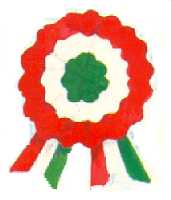 |
(1823-1849) |
His biography |
 |
(1823-1849) |
His biography |
| National
Song
Rise up, Magyar, the country calls!
For up till now we lived like slaves,
A coward and a lowly bastard
Sabers outshine chaine and fetters,
Magyar's name will tell the story
Where our grave-mounds bulge and huddle
(March 13. 1848) Tr: Adam Makkai
|
March15.
1848

151th Anniversary of the Hungarian War of Independence (1848-49)
The National Museum, where Petofi recited his poem on March the 15th 1848 before thousands, and with that the War of Independence against the Habsburgs has started. |
Talpra magyar, hí a haza !
Rabok voltunk mostanáig,
Sehonnai bitang ember,
Fényesebb a láncnál
a kard,
A magyar név megint szép lesz,
Hol sírjaink domborulnak,
(Pest, 1848. március 13.) |
| I'll be a tree
I'll be a tree, if you are its flower,
My lovely girl, if you are the Heaven,
Tr: Egon F. Kunz |
Fa leszek
Fa leszek, ha fának vagy virága.
Ha, leányka, te vagy a mennyország:
Szalkszentmárton, 1845. aug. 20. - szept. 8. között
|
| The shepherd rides in donkey-back
The shepherd rides in donkey-back,
He played his flute, he grazed his flock
He rides his donkey in a flash
The lad was bitter, hoped to die,
Tr: Peter Zollman |
Megy a juhász szamáron
Megy a juhász szamáron,
Gyepes hanton furulyált,
Fölpattan a szamárra,
Elkeseredésében
Kúnszentmiklós, 1844. július
|
| [From The clouds ]
SORROW? A GREAT OCEAN.
Tr: W.H. Auden THE FARMER PUTS HIS FIELD under the plow,
Tr: Peter Zollman HOW MANY DROPS HAS THE OCEAN SEA?
Tr: Peter Zollman |
[Felhök-böl]
A BÁNAT? EGY NAGY OCEÁN
Szalkszentmárton, 1846. március 10. előtt FÖLDÉT A FÖLDMIVES felszántja,
Szalkszentmárton, 1846. március 10. előtt
|
Biography:
Petofi Sandor: Hungarian lyric poet b. Jan. 1, 1823, enriched the artistry
and extended the range of his
nation's poetry beyond any predecessor and created a new synthesis
of poetic techniques and realistic subjects. His epics were
powerful blends of folk topics, attitudes, and verse forms, and his
lyric poems stood out as aesthetic expressions of genuinely
felt human experiences. They celebrated nature, the joys and sorrows
of common folk, married love, family life, and patriotism.
His language, images, folklore, and characters were rooted in the Hungarian
Great Plains. He participated in Hungary's War of
Independence (1848-49) and disappeared on July 31, 1849, in a battle
against Russian forces. He was probably buried in a
mass grave.